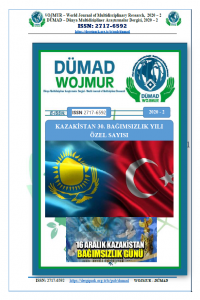Abstract
References
- Belton, Daniel & Ebbert, Ashley & Infurna, Frank. (2016). Social Intelligence.
- Gardner, H. (1999). Intelligence reframed: Multiple intelligences for the 21st century. New York, NY: Basic Books.
- Goleman, D., & Boyatzis, R. (2008). Social intelligence and the biology of leadership. Harvard Business Review, 86(9), 74–81.
- Moss, F. A., Hunt, T., Omwake, K. T., & Woodward, L. G. (1955). Manual for the George Washington University Series Social Intelligence Test. Washington, DC: Center for Psychological Service.
- Thorndike, E. L. (1920). Intelligence and its use. Harper’s Magazine, 140, 227–235.
- Vernon, P. E. (1933). Some characteristics of the good judge of personality. Journal of Social Psychology, 4, 42–57.
- Sternberg R., Kaufman S. B. (2011). The Cambridge Handbook of Intelligence.
Abstract
The article considers the issue of priority of social intelligence in the university space. For the future pedagogue, social intelligence is a key factor in achieving success. Therefore, the problems of the development of social intelligence in the educational space should be considered taking into account the personal characteristics of students. Thus, the article reveals the reason for choosing generation Z as the main participants in this process, and also offers recommendations on the organization of the educational process in pedagogical specialties.
Keywords
Social intelligence interaction educational process generation Z society emotional intelligence teacher
References
- Belton, Daniel & Ebbert, Ashley & Infurna, Frank. (2016). Social Intelligence.
- Gardner, H. (1999). Intelligence reframed: Multiple intelligences for the 21st century. New York, NY: Basic Books.
- Goleman, D., & Boyatzis, R. (2008). Social intelligence and the biology of leadership. Harvard Business Review, 86(9), 74–81.
- Moss, F. A., Hunt, T., Omwake, K. T., & Woodward, L. G. (1955). Manual for the George Washington University Series Social Intelligence Test. Washington, DC: Center for Psychological Service.
- Thorndike, E. L. (1920). Intelligence and its use. Harper’s Magazine, 140, 227–235.
- Vernon, P. E. (1933). Some characteristics of the good judge of personality. Journal of Social Psychology, 4, 42–57.
- Sternberg R., Kaufman S. B. (2011). The Cambridge Handbook of Intelligence.
Abstract
На сегодняшний день «социальный интеллект» является не новейшей темой для обсуждения, однако актуальность понятия с каждым годом расширяется. Причиной тому послужили трансформация процессов отдельных сфер, а также изменения в межличностных взаимоотношениях.
Первая причина связана с тем, что сфера государственного управления тесно взаимодействует с бизнес структурами, применяя новые методы менеджмента. Производственная среда пользуется экономическим сектором (финансирование) для того, чтобы создавать новые технологии и рабочие места, а это позитивно влияет на сферу науки в целом. В свою очередь, образовательная среда перешла на принцип безграничной доступности, предоставляя своим «клиентам» широкий спектр услуг всеми способами.
Касательно второй причины, диада «человек-человек» и «человек-общество» подверглась изменениям, так как появились инновационные технологии, которые дали возможность использовать различные методы общения. С каждым годом живые общения минимизируются, и увеличивается общения через гаджеты и платформы взаимообмена сообщениями и звонками.
Keywords
Social intelligence interaction educational process generation Z society emotional intelligence teacher
References
- Belton, Daniel & Ebbert, Ashley & Infurna, Frank. (2016). Social Intelligence.
- Gardner, H. (1999). Intelligence reframed: Multiple intelligences for the 21st century. New York, NY: Basic Books.
- Goleman, D., & Boyatzis, R. (2008). Social intelligence and the biology of leadership. Harvard Business Review, 86(9), 74–81.
- Moss, F. A., Hunt, T., Omwake, K. T., & Woodward, L. G. (1955). Manual for the George Washington University Series Social Intelligence Test. Washington, DC: Center for Psychological Service.
- Thorndike, E. L. (1920). Intelligence and its use. Harper’s Magazine, 140, 227–235.
- Vernon, P. E. (1933). Some characteristics of the good judge of personality. Journal of Social Psychology, 4, 42–57.
- Sternberg R., Kaufman S. B. (2011). The Cambridge Handbook of Intelligence.
Details
| Primary Language | Russian |
|---|---|
| Journal Section | Conference Proceeding |
| Authors | |
| Publication Date | January 15, 2020 |
| Published in Issue | Year 2020 Volume: 2020 Issue: 2 - KAZAKİSTAN 30. BAĞIMSIZLIK YILI ÖZEL SAYISI |

